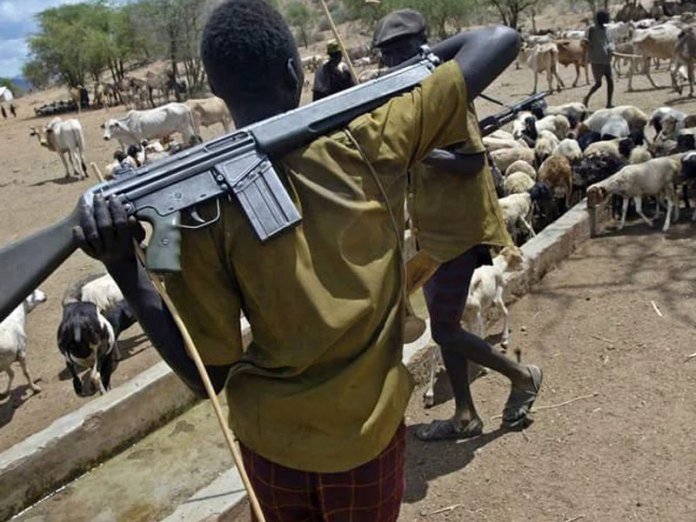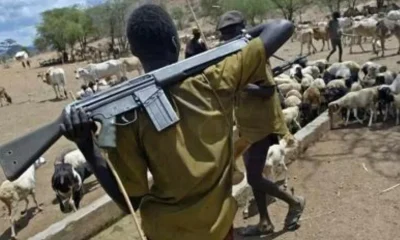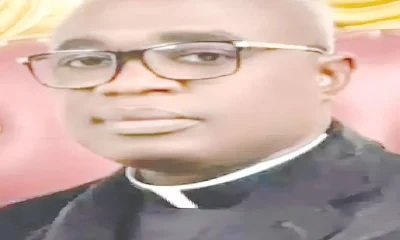News
Herdsmen: High Court Bans Open Grazing, Akeredolu Rules Effective Tomorrow

By Abankula
From tomorrow, Governor Rotimi Akeredolu’s seven-day grace to herdsmen to comply with a slew of rules will become effective.
With the rules being challenged by Aso Rock and Miyetti Allah, a legal boost for correctness of the order has emerged in a revelation that a 1969 judgement in Abeokuta, Ogun state outlawed open cattle grazing.
The judgment, which was not challenged, was given by Justice Adewale Thompson on 17 April, 1969 in Suit no AB/26/66.
Johnson died in 2004 at the age of 82, his last role in retirement being secretary of Yoruba Elders Council(YCE).
In his judgement, the jurist pronounced:
“I do not accept the contention of Defendants that a custom exists which imposes an obligation on the owner of farm to fence his farm whilst the owner of cattle allows his cattle to wander like pests and cause damage. Such a custom if it exists, is unreasonable and I hold that it is repugnant to natural justice, equity and good conscience and therefore unenforceable…in that it is highly unreasonable to impose the burden of fencing a farm on the farmer without the corresponding obligation on the cattle owner to fence in his cattle.”
“Sequence to that I banned open grazing for it is inimical to peace and tranquility and the cattle owners must fence or ranch their animals for peace to reign in these communities.”
Thompson appeared to have seen far into the future.
Governor Rotimi Akeredolu in rolling out measures to ensure peace in Ondo State, on 18 January used a similar language.
“Today we have taken major steps at addressing the root cause of kidnapping, in particular, and other nefarious activities detailed and documented in security reports, the press and debriefings from victims of kidnap cases in Ondo State.
“These unfortunate incidents are traceable to the activities of some bad elements masquerading as herdsmen. These felons have turned our forest reserves into hideouts for keeping victims of kidnapping, negotiating for ransom and carrying out other criminal activities.
As the Chief Law and Security Officer of the State, it is my constitutional obligation to do everything lawful to protect the lives and property of all residents of the State. In light of the foregoing, the following orders are hereby issued:
*All Forest Reserves in the State are to be vacated by herdsmen within the next 7 days with effect from today, Monday 18th January, 2021.
*Night-grazing is banned with immediate effect because most farm destruction takes place at night.
*Movement of cattle within cities and highways is prohibited.
*Under-aged grazing of cattle is outlawed.
“Our resolution to guarantee safety of lives and property within the State shall remain utmost as security agencies have been directed to enforce the ban.
“In its usual magnanimity, our administration will give a grace period of seven days for those who wish to carry on with their cattle-rearing business to register with appropriate authorities”.
The 7-day grace expires on Monday.
Officials of the State Ministry of Justice said the Ondo government derived the legal basis for its action, not just from the constitution, but two legal instruments.
One is the Land Use Act, part of the 1999 constitution, which vests the control of the land in the state on the governor.
The other legal instrument is the 1969 Trade Cattle Tax Law of Ondo State, enacted in the West, the same year that Justice Thompson made his historic judgment.
In interviews with Nigerian Tribune, officials cited provisions of the Act.
“Section 12 (1) of the same Act also states that: “It shall be lawful for the governor to grant a licence to any person to enter upon any land” and explained further that while sub-section 5 thereof clearly states that “the governor may cancel any such licence if the licensee fails to comply with any of the conditions of the licence.”
“The word ‘licence’ here simply means permit. Basically, therefore, it is within the powers of a state governor to grant a licence, permit or right to anyone to enter any land within the state, and to cancel or withdraw such permit or licence if the holder violates any condition attendant to same.
“It goes without saying, therefore, that the governor can impose conditions on anyone to enter and/or be licensed to enter any land within the state.
“The Ondo State governor, therefore, has the power to order herdsmen or any other persons carrying on any other business on lands within the territory of the state to apply for permit or licence to do so under the above clear provisions of the Land Use Act. That cannot, in any way, be interpreted as a violation of the fundamental right to freedom of movement.”
The Trade Cattle Tax Law of Ondo State, which has a commencement date of July 3, 1969, also provides:
“Section 2 of the law talks about “movement permit, which is defined as a movement permit issued in the state under the Control Trade Cattle Regulations or a permit relating to the movement of trade cattle issued by any authority having power to issue the same under any law in force in any other part of Nigeria.”
“Among the animals listed in the first schedule to the law are cow, bull, sheep and goat. So, the law applies to those who carry on the business of herding such animals other than as domestic animals.
“Section 5 of the law again recognises the legitimacy of issuing trade cattle movement permit along ‘recognisable trade cattle route’, while Section 4 thereof provides for the establishment of ‘a cattle control post or inspection station, as the case may be, for the purposes of the Law’.
PM News
-

 News4 days ago
News4 days agoInsecurity: Kogi Schools Resume On Monday
-

 Opinion3 days ago
Opinion3 days agoDon’t Pull the Plug: Why Nigerians Are Pleading for the U.S. to Extend Its Police Training Program — and Why It Must Synergize With New Military Arrivals
-

 Crime3 days ago
Crime3 days agoVigilante Reportedly Shoots Colleague Dead In Plateau
-

 Crime5 days ago
Crime5 days agoPolice Arrest Two Over Murder Of 62-Year-Old Woman In Oyo













